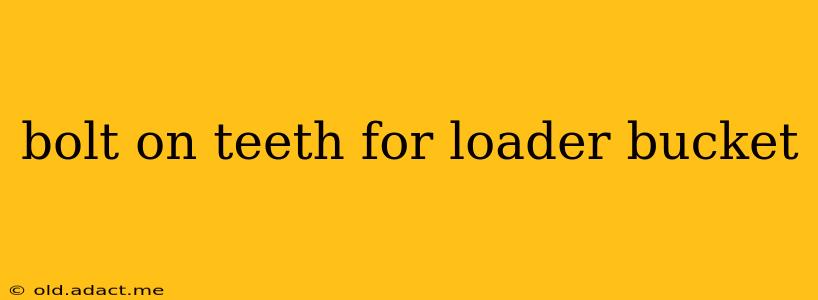Choosing the right bolt-on teeth for your loader bucket is crucial for maximizing efficiency and minimizing downtime. This comprehensive guide will cover everything you need to know, from understanding different tooth types to proper installation and maintenance. Whether you're working in construction, agriculture, demolition, or landscaping, selecting the appropriate teeth is vital for optimal performance and longevity of your equipment.
What are Bolt-On Teeth?
Bolt-on teeth are replaceable cutting edges attached to the lip of a loader bucket. Unlike welded teeth, they are secured using bolts, allowing for easy replacement when worn or damaged. This significantly reduces downtime and repair costs compared to replacing entire bucket lips. The ease of replacement makes them a popular choice for a wide range of applications.
Different Types of Bolt-On Teeth
Several types of bolt-on teeth cater to various materials and applications:
-
Standard Teeth: These are the most common type, offering a balance between durability and cost-effectiveness. They're suitable for general-purpose digging and loading in various materials.
-
Heavy-Duty Teeth: Designed for demanding applications involving extremely hard or abrasive materials, these teeth offer superior strength and wear resistance. Expect a longer lifespan, but at a higher initial cost.
-
Side-Cutting Teeth: These teeth feature sharpened sides, enabling them to effectively cut through tough materials, making them ideal for applications requiring precise cutting or trenching.
-
Rock Teeth: Specifically designed for breaking up and handling rocks and other extremely hard materials, rock teeth possess exceptional durability and impact resistance. They are typically more robust and pointed than standard teeth.
How to Choose the Right Bolt-On Teeth
Choosing the right bolt-on teeth involves considering several factors:
-
Material to be handled: The hardness and abrasiveness of the material you'll be working with directly impacts the type of tooth required. Harder materials necessitate more durable, heavy-duty teeth.
-
Application: Different applications demand different tooth profiles. For example, side-cutting teeth are ideal for trenching, while rock teeth are best suited for breaking rocks.
-
Bucket size and type: The size and type of your loader bucket determine the appropriate tooth size and configuration. Ensure compatibility before purchasing.
-
Budget: While heavy-duty teeth last longer, they come with a higher price tag. Balance longevity with your budget when making your decision.
How to Install Bolt-On Teeth
Installing bolt-on teeth is generally straightforward, but proper technique is crucial to ensure a secure and long-lasting fit. Always consult your loader bucket's manual for specific instructions. Generally, the process involves:
-
Removing worn teeth: Carefully remove the bolts securing the old teeth and then detach the worn teeth.
-
Cleaning the mounting holes: Thoroughly clean the mounting holes to remove any debris.
-
Installing new teeth: Insert the new teeth into the mounting holes and secure them with the provided bolts.
-
Tightening bolts: Tighten the bolts according to the manufacturer's specifications. Ensure even tightening to prevent damage.
How Often Should Bolt-On Teeth Be Replaced?
The frequency of bolt-on tooth replacement depends on the intensity of use and the material being handled. Regular inspection is key. Look for signs of wear such as excessive chipping, cracking, or significant shortening. Replace worn teeth promptly to prevent damage to the bucket and maintain optimal performance. Proactive maintenance saves money in the long run.
What Happens if You Don't Replace Worn Teeth?
Using worn-out teeth leads to decreased productivity, increased fuel consumption, and potential damage to the loader bucket and its components. Worn teeth reduce digging efficiency and increase the likelihood of bucket damage, potentially leading to costly repairs or replacements.
Are there different sizes of bolt-on teeth?
Yes, bolt-on teeth come in various sizes to match different loader bucket sizes and applications. Always check the manufacturer's specifications to ensure compatibility with your equipment. Incorrect sizing can compromise performance and safety.
Can I weld on bolt-on teeth?
No, welding on bolt-on teeth is not recommended. The design of bolt-on teeth allows for easy replacement. Welding compromises their ability to be easily changed and can damage the underlying structure.
This guide provides a solid foundation for selecting and utilizing bolt-on teeth effectively. Remember that consulting your equipment's manual and contacting a specialized supplier will provide the most accurate information for your specific needs. Investing in high-quality teeth ensures maximum efficiency and longevity for your loader bucket.
